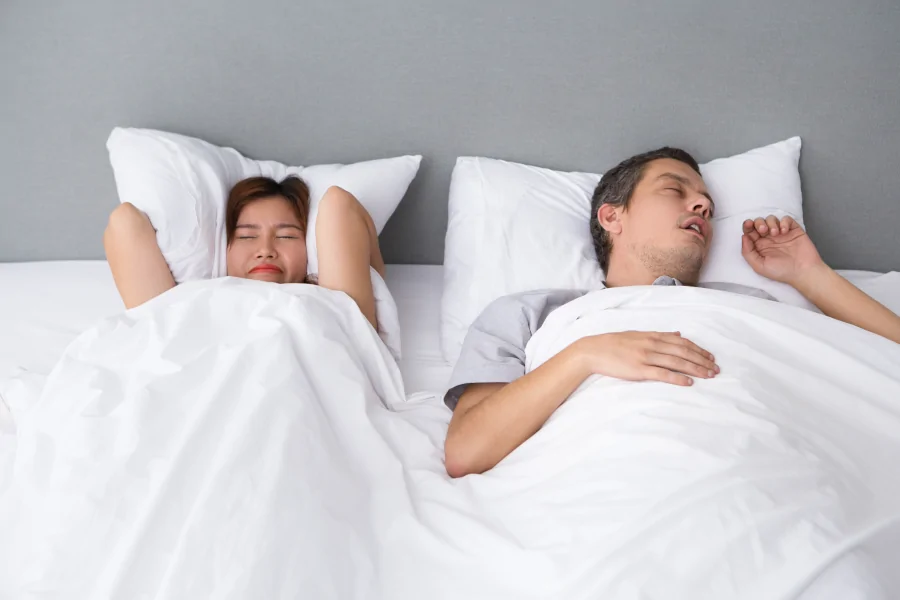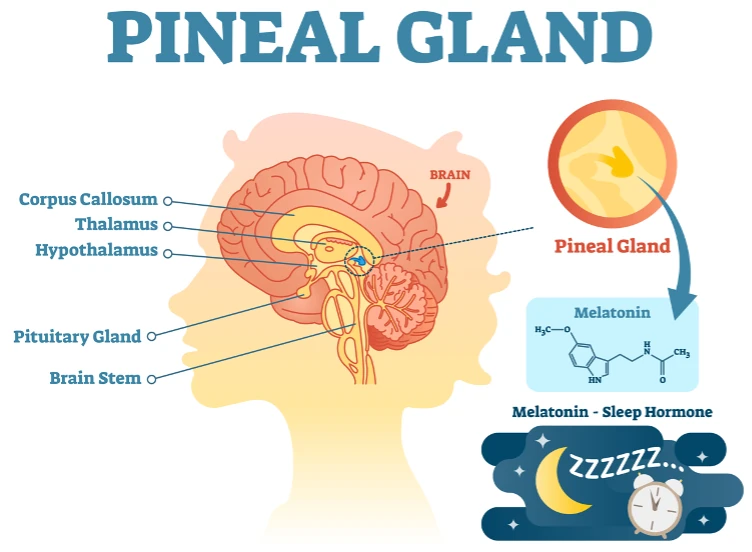Snoring is a common issue that can severely impact the sleep quality of the person snoring and their bed partner. Snoring is a widespread issue in the United Kingdom, with a prevalence rate reaching up to 40% of the population. Additionally, research on sleep-disordered breathing among children in the UK revealed that around 12% of children aged 4 to 5 years old exhibit snoring behaviour, with up to 2% suffering from the more severe condition of Obstructive Sleep Apnoea (OSA).
There are some effective methods to tackle snoring, providing hope for those suffering from this problem. This article will discuss various tips and remedies to reduce or eliminate the loud night time noises caused by snoring. By implementing these strategies, bed partners can increase their chances of achieving the peaceful, uninterrupted sleep necessary for their well-being.
What causes snoring?
Snoring occurs when the airflow through the mouth and nose is physically obstructed during sleep. It is produced when the air we breathe passes through a narrowed airway, causing the relaxed upper airway dilator muscles in the throat to vibrate.
Several factors can contribute to increased airway narrowing and snoring. Nasal congestion from allergies, colds, or anatomical abnormalities such as deviated nasal septum, enlarged tonsils or adenoids can restrict airflow. Additionally, genetics play a role, with some individuals being predisposed to snoring due to inherited facial or airway structures.
Being overweight or obese can cause snoring by increasing soft tissue around the throat that may collapse inwards during sleep. Alcohol consumption and certain sleeping positions, like sleeping on the back, can also exacerbate snoring by relaxing the throat muscles. Moreover, some medical conditions like hypothyroidism, a condition characterised by an underactive thyroid gland, can cause the throat muscles to relax excessively, leading to snoring.
While occasional, mild snoring is common and not necessarily cause for concern, persistent, loud snoring can indicate underlying sleep disorders like obstructive sleep apnoea. In these cases, snoring results from the airway becoming repeatedly blocked, forcing awakenings to resume normal breathing. It’s important to note that sleep apnoea can also lead to other health complications like high blood pressure, heart failure, and increased risk of accidents due to excessive daytime sleepiness. Chronic loud snoring demands medical evaluation, as untreated sleep disorders can also increase risks for other health issues like heart disease and stroke.
How to sleep when someone is snoring?
While snoring can be disruptive, mild and occasional snoring does not necessarily indicate an underlying health condition, and there are strategies to help you cope and get the rest you need. By implementing relaxation techniques, creating a sleep-friendly environment, and masking the noise, you can increase your chances of achieving quality sleep even when sharing a bed with a night snorer.
Relaxation techniques
Don’t let the frustration of snoring keep you awake. Relaxation methods like deep breathing exercises, progressive muscle relaxation, and meditation can help calm your mind and body for better sleep. Deep breathing promotes relaxation by increasing oxygen flow. Progressive muscle relaxation involves systematically tensing and releasing muscle groups to relieve physical tension. Meditation guides you through focusing your mind on the present moment rather than the distraction of snoring, which can help you fall asleep more easily. Practising these techniques regularly can help you develop healthier sleep habits and improve your overall well-being.
Create a calming sleep environment
Blocking out the sounds of mild snoring can help you sleep better. Earplugs are an affordable way to reduce noise; foam earplugs completely block sound, while moldable wax earplugs allow you to hear important sounds like alarms. White noise machines create calming background sounds like rain, ocean waves, or fan noises to cover up disruptive snoring. Research shows that white noise significantly enhances sleep quality. It’s important to note that white noise could mask important sounds that one may need to hear, such as a baby crying or a morning alarm clock.
Create an ideal sleeping environment
In addition to controlling noise, cultivating a cool, dark, quiet bedroom creates an ideal sleep environment. Using blackout curtains or an eye mask to block out light, keeping electronics out of the bedroom to minimise distractions, and setting the thermostat to a comfortable temperature can promote higher-quality, uninterrupted sleep. Creating a relaxing bedtime routine, such as taking a warm bath or practising light stretching, can also help signal your body that it’s time to wind down and prepare for sleep. Establishing these healthy sleep habits can help you cope with mild snoring and improve your overall sleep quality and daytime energy levels.
How to stop someone from snoring without waking them?
When snoring becomes a persistent problem that severely impacts one’s ability to sleep, it’s essential to take proactive measures to address the issue. From encouraging positional changes to lifestyle adjustments and seeking medical assistance, various approaches can help to reduce disruptive snoring and promote better sleep for both partners without constantly waking or disturbing the snorer.
Positional therapy
Positional therapy can be an effective and non-invasive way to reduce snoring, especially for those who are not severely overweight or suffering from sleep apnoea. Sleep position plays a significant role in snoring, as lying on the back allows the throat tissues to collapse inward more easily. Encourage your partner to sleep on their side, which prevents airway narrowing and reduces snoring. Special pillows designed to avoid back-sleeping or strategically placed pillows to create soft barriers around them can promote side-sleeping without direct intervention.
Lifestyle adjustments
For some individuals, making specific lifestyle changes may alleviate snoring. Obesity has been significantly associated with snoring and obstructed sleep apnoea. Losing excess weight can decrease soft tissue around the airway and reduce the risk of obstructive sleep apnoea. Alcohol consumption has been associated with increased severity of snoring. Avoiding alcohol close to bedtime prevents over-relaxation of throat muscles, which can worsen snoring. Smoking cessation and raising the head off the bed by about 4 inches can also facilitate better airflow and reduce snoring.
Using a humidifier to add moisture to the air, taking nasal decongestants, or avoiding certain medications before bed can also help improve airflow and reduce snoring. Adhesive nasal strips or external nasal dilators may help increase nasal passage area and improve breathing, although they are ineffective for treating obstructive sleep apnoea. To alleviate nasal obstruction, underlying conditions like allergies or a deviated septum should be addressed.
Ensuring adequate sleep duration based on age recommendations is crucial. Adults should aim for at least 7 hours per night, while children’s sleep needs vary from 8 to 13 hours, depending on their age. It’s crucial to consult a doctor for personalised guidance on beneficial lifestyle adjustments, as some remedies may interact with existing medical conditions or medications.
Seek medical assistance
If home remedies and lifestyle changes aren’t providing sufficient relief, it may be time to seek professional medical help. Chronic, intense snoring could be a symptom of an underlying condition like obstructive sleep apnoea, which requires proper treatment to prevent serious health complications. A doctor or sleep specialist can evaluate the situation thoroughly, identify the root cause, and recommend appropriate treatment options, such as oral appliances, CPAP therapy, or surgical interventions in severe cases.
It’s essential to be proactive about seeking medical attention, as untreated sleep disorders can significantly impact overall health and quality of life, increasing the risk of various chronic diseases and accidents due to excessive daytime sleepiness.
What’s the best course of action?
Persistent, disruptive snoring should not be ignored, as it can be a symptom of an underlying condition like obstructive sleep apnoea, which requires proper medical treatment. Addressing the root cause of snoring is crucial for restoring restful sleep and preventing potential health complications. However, various strategies can help reduce the effects of snoring and promote better sleep for both partners.
The key takeaways are to explore positional therapy, make beneficial lifestyle adjustments, and create a calming sleep environment. Side-sleeping, weight loss, avoiding alcohol before bed, and using white noise machines or earplugs can significantly reduce snoring and its impact on sleep quality. If these measures prove insufficient, seeking medical guidance from a sleep specialist is recommended. They can accurately diagnose underlying conditions and provide appropriate treatment options, such as oral appliances, CPAP therapy, or surgical interventions when necessary. The right approach makes a peaceful sleep attainable for even the most persistent snorers and their partners.
How can Dr Dipesh Mistry help?
If your loud, persistent snoring leaves you exhausted and desperate for relief, seeking professional guidance is crucial. In some cases, an underlying health cause may need to be addressed to reduce your snoring. As a leading sleep physician and psychiatrist, we offer sleep psychiatrist consultations for those having trouble sleeping.
As a leading sleep physician and psychiatrist, we offer sleep psychiatrist consultations as well as investigations for those having trouble sleeping. Please contact us if you require further advice if you are struggling to fall asleep.










